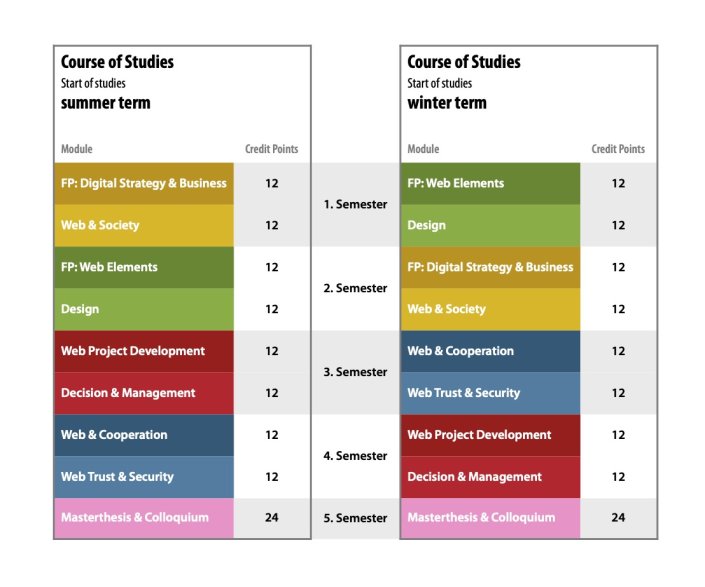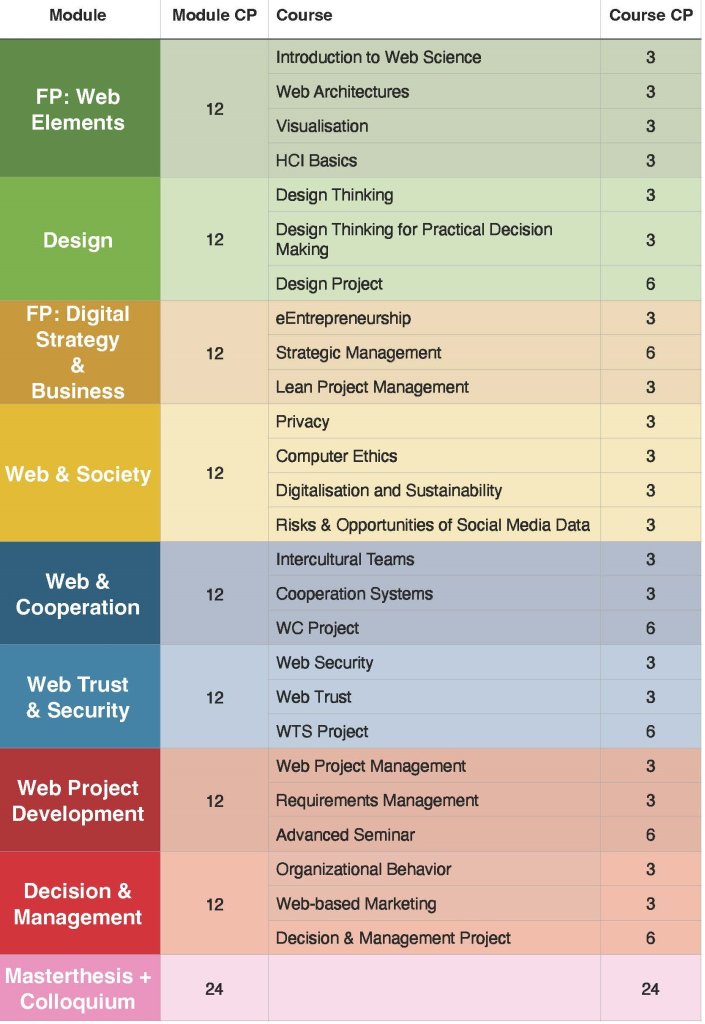Web Science (Master’s Online Program) Program Content
The online Master's program in Web Science is designed for professionals who have successfullycompleted a related undergraduate program and have experience ina web-related field. The medium of instruction is English. Thisprogram is strategically devised to empower participants todeepen their knowledge to take on leadership positions, such asproject managers, data scientists or IT consultants.
Comprehensive Coverage of Web-Related Disciplines
The five-semester online Master's program covers a wide range of web-related fields. Successful completion of this intensive five-semester journey results in the awarding of the degree 'Master of Science'.
In addition to providing fundamental knowledge on Web architecture and concepts, the Master's program places emphasis on a wide range of subjects, including strategy and social media marketing and security issues. Furthermore, students acquire expertise in project management, digital leadership, IT consultation, data analysists and UX experts.
Combining online courses and online weekends for optimal success
The online Master’s program Web Science is taught parallel to professional employment. The program combines online courses with two intensive online weekends – one in the beginning and one in the end of the semester. Teaching methods include seminar and project based learning, case studies and online group work using online tools.
Throughout the semester, two evening online sessions per week ensure sustained engagement.. Additionally, participants have access to a dedicated learning platform for asynchronous communication and collaboration. Participants follow the online courses at home on their computers equipped with webcam and headset. Using Zoom, students can interactively take part in the discourse just like they would in a traditional lecture hall.
All instructional materials are presented in digital formats. Commencing and concluding each semester, lecturers and students meet for an enriching online weekend, typically spanning from Friday to Saturday. The program concludes with a Master’s thesis and a final oral examination.
Module and Course Descriptions
 Module Plan
(Image: Web Science TH Köln)
Module Plan
(Image: Web Science TH Köln)
Students will attend two modules per semester. The specific modules to begin with will depend on whether starting your studies in the summer or winter term. For those starting in the summer term, the modules will be Foundations and Principles: Digital Strategy and Business along with Web & Society (WS). Conversely, for those beginning in the winter term, the modules will be Foundations and Principles: Web Elements along with Design. You can find more details in the provided course plan.
The modules are structured to span two academic years, with the intention of fostering collaboration among students across different terms. The teaching philosophy places a strong emphasis on developing project management skills, with projects being an integral part of the program in almost every phase. Additionally, the curriculum emphasizes methodic, scientific and communication abilities through seminal work.
The entire program consists of 120 credit points. Each semester offers two modules, and each module is worth 12 credit points, equivalent to 300 hours of workload. This workload is distributed across courses, each carrying 3 credit points, and projects, each worth 6 credit points.
The Master's thesis is intended for the fifth and last semester.
Foundations and Principles: Web Elements
The module includes the following courses:
- Introduction to Web Science
- Web Architectures
- Human-Computer Interaction Basics
- Visualisation
Intended Learning Outcomes
Crucial to this module is that the participants, despite their own educational and professional background, develop a common basic vocabulary of the web science discipline. The students know the relevant issues and perspectives of the discipline Web Science, own the capability to interrelate and to apply them to current domain problems and to produce solutions. They are able to appraise and discuss produced solutions critically. They are familiar with the different architectural pattern of web-based systems, the interrelations of contributing modules, components and protocols. The students are able to analyze and discuss web applications from an architectural perspective. They perceive openness and decentralization as key properties of the web, understand the impact of fundamental principles of resources, interaction, and identification, understand the role of architecture and architectural patterns for the analysis and evolution of web applications, and are able to identify and discuss the role of information modeling in the web in contrast to more traditional data(base system) centric approaches.
Application classes like peer-to-peer applications, synchronously or asynchronously interacting applications and services can be distinguished and discussed based on their architectural patterns, protocols and typical uses. The students are able to identify the primary needs for the quality management of web-based systems. They know existing approaches, concepts and methods for (software) quality and quality management and are able to discuss their similarities and differences, know established techniques of quality planning, quality assurance, quality control, and quality optimization on organizational, project, and development phase scale and are able to judge them critically in terms of business, risk, and other kinds of objectives, and are able to derive appropriate requirements for quality management systems from high-level (e.g. business) objectives.
They know quality criteria of different disciplines (e.g. software-engineering, design, economy) and are able to incorporate them into Web Science projects. They show the ability to develop method-based solutions, to communicate these solutions through representations (such as abstract or concrete prototypes) and to critically discuss them.
The students know approaches and procedures for the elicitation of relevant data from web-based systems, are familiar with underlying foundations (such as statistics), learn to apply concepts and methods of web analytics to actual questions and show the ability to critically discuss interpretations and consequences for the conceptual design and the maintenance of web-based systems. This includes the ability to bear several domain perspectives (economy, ergonomics and so on).
The students enhance their abilities in terms of formal and abstract thinking, in terms of divergent and convergent thinking and their capability to design solutions based on a more holistic view. After attending the course, the students are able to recognize the connection between function and design, critically analyze it and develop target-oriented, integrated solutions in communication and design. They know the fundamentals of visual communication in use of color, shape, typography and pictures, are proficient in usage of basic design-related technical terms and have the ability to identify the best possible solution for a task from a variety of design-alternatives and to communicate the reasons for their decision comprehensible.
Foundations and Principles: Digital Strategy and Business
The module includes the following courses:
- E-Entrepreneurship
- Lean Project Management
- Strategic Management
- Introduction to Web Science
Intended Learning Outcomes
The students receive an overview of the most important economic and societal references of the web, develop the ability to establish relationships between subjects and are capable to master state-of-the-art economic questions in context of the web.
Attending the course, the students learn about the essential strategic and operational decision fields of importance in the area of marketing products and services through the web. This refers to strategic decisions affecting customers, competitors and sales partner. The students obtain a broad perspective on the possible strategy options in web context and on the economic modelst hat support the selection of strategic options as well as on practical possibilities to encircle attractive target groups. Regarding operational issues, the students should learn about the spectrum of decisions in the area of product, price, promotion und penetration. The important contents are delivered by practical case studies.
Apart from the above mentioned subjects on marketing and strategy, the students will be able to apply the most important quantitative and qualitative models and success factors that allow an economic evaluation of web based projects. In concrete situations the students can select an adequate methodology based on systematic criteria and accomplish cost-effective evaluation.
Web Trust and Security
The module includes the following courses:
- Web Security
- Web Trust and Security Project
- Web Trust
Intended Learning Outcomes
The participants achieve good knowledge about the most important aspects allowing and involving “secure” web based communication in a comprehensive view. This covers on the one hand the so called classical topics concerning IT security (e. g. assurance of confidentiality or privacy, of integrity and of availability in respect of certain protection targets) in a way focused on the web. On the other hand specific questions on authenticity and originality of web contents’ and identities have to be answered. Special notice – because of the strongly increasing usage of mobile web access – has to be attracted to mobile environments and their specific implications on security aspects.
In this module the students learn to systematically analyse scenarios in respect of their relevant security aspects in a comprehensive way. The development of concepts for those scenarios is also part of the methodology. This covers the systematic itself as well as its application, in general and in the special web context. Basis is here the IT baseline protection (in German: IT-Grundschutz) and derived methods. Besides methods also practice, utilities and tools will be considered and their successful application will be imparted. Important competences in this regard are the ability to analyse systems in view of security vulnerabilities, the knowledge of reasons for security weaknesses, the critically challenge of conclusions concerning security and training of analytical skills based on concrete use cases.
Another focus is put on procurement of required competences to use resources available in the web appropriately. To achieve this topics concerning aspects of contents and their evaluation (according to correctness, availibitity, authenticity, ...) are dealt with and analysed based on case studies, as well as the identity question (involved systems, instances, humans, resources in general) and the verification of identities. Ways of abusing and possible countermeasures will of course also be considered.
In mobile environments there are special conditions. For example, certain security features of communication channels may be unknown, communication may be intercepted or recorded, terminal equipment may get lost or be stolen. Or the usability of special services may depend on the current context of usage, e. g. the user’s current environment. By working out systematic and methods the students acquire competences to handle such constraints in a qualified manner.
Decision & Management
The module includes the following courses:
- Organizational Behavior
- Decision and Management Project
- Web Based Marketing
Intended Learning Outcomes
The students will develop a basic understanding for crucial aspects of organizational behavior theory, network theory, and communication theory to demonstrate best practices in organizational leadership. They will be able to identify different organizational options and assess their risks and chances.
The students will understand crucial ideas, impacts and effects of web megatrends like Cloud Computing, Internet of Things, Agile IT and Big Data on organizations, enterprises and teams. The students get an integrated knowledge of modern innovative systems like Open Innovation.
The students will know the strategic benefits and risks of strategic networks, virtual organizations and collaborative systems of work. They will reflect the modern approach of transaction theory. They are able to apply the approaches of new institutional economics on modern organizational questions. This includes an evaluation of the critical success factors in concrete implementations.
The students get an integrated knowledge of leadership theory and will be able to discuss the efficiency advantages of a suitable modern leadership. They can correctly use different intercultural behavior frames of reference to diagnose individual and group situations in the international context.
Web & Cooperation
The module includes the following courses:
- Web and Cooperation Project
- Cooperation Systems
- Intercultural Teams
Intended Learning Outcomes
Attending the courses of the module, the students learn to provide and discuss conceptual designs, analysis and evaluations of web applications as socio-technical systems.
The students know the essential concepts and methods of „Computer Supported Collaborative Work“ (CSCW). They are able competently contribute to a scientific discourse, critically analyzing the adequacy of theses concepts and methods for applications in the web.
The students know essential concepts and methods of „Social Networks Theory and Architecture“.They are able competently contribute to a scientific discourse, critically analyzing the mutual influence of social networks and structures, processes, and strategies of enterprises.
From the point of view of media psychology, the students are able to critically discuss the interplay of web applications and the behavior of individuals or groups.
Design
The module includes the following courses:
- Design Project
- Design Thinking
- Design Thinking for Practical Decision Making
Intended Learning Outcomes
The students know the relevant design disciplines in context of the web. They are familiar with their perspectives, tasks and approaches. They know major terms and rules of different disciplines and are able to identify problems, tasks and challenges concerning design. Further more, they are able to discuss these issues within an interdisciplinary team.
The students are familiar with technical requirements in design context, with focus on web-based systems. They are able to analyze, argue, discuss and evaluate design concepts and variants. They know fundamentals on visual perception and they are able to decode and describe different visual contexts. They are able to define and to identify design objectives, and to put them into relationship with web-based systems.
The students have a basic knowledge of the historic background and the most influential protagonists of the different design disciplines in the past and present. On this basis they are able to generate forward looking and trend-setting concepts.
The students know how to measure the quality of concepts, layout, interaction and design. They are able to manage the creation of new concepts, designs or design adaptions as well as keeping that process in line with the given design objectives and the existing design context. They are aware of the consequences that prospective design related decisions have on internal and external appreciation of corporate-, brand- or product-identity. They are also able to put single design measures into context with broader objectives and their economical effects.
Web & Society
The module includes the following courses:
- Privacy
- Risks and Opportunities of Social Media Data
- Computer Ethics
- Digitalisation and Sustainability
Intended Learning Outcomes
The students know aspects of Social Structures, Social Practices, Social Institutions, Social Stratifications and Social Change. Some of the related concepts are society, culture, socialisation, social groups, norm and deviation, ageing, race and ethnicity, gender, stratification, global poverty/global inequality, family, health and medicine, politics, education, collective behaviour, social movements, demography etc. .
In addition the students have learned to integrate concepts, approaches or aspects from the other Courses of this module into their project to cover a more comprehensive view.
They will be able to discuss and critically judge the mutual interplay of web based systems (especially by taking aspects of privacy, media psychology and social media into account) and social/societal aspects.
The students identify privacy as a relevant subject for web science and it's application in and for the web. They are able to explain the notion and meaning of privacy, to outline, what a right to privacy protects, to identify the conflicts between privacy, other human rights and interests, to understand how privacy is protected in the Europe, to critically analyse the right to privacy as enshrined in the European Convention on Human Rights and how the European Court of Human Rights has interpreted this right, to summarise the elements which must be proven to show a breach of confidence and to evaluate whether the law relating to breach of confidence embraces privacy.
The students know the notion of transparency as well as open data and know their advantages as well as legal implications of it. The students how enterprises and authorities could publish their data in a linked open format so that they can be accessed, used and reused (based on the open government licence), know when data cannot be published due to privacy, commercial sensitivity or other restrictions.
Web Project Development
The module includes the following courses:
- Advanced Seminar
- Web Project Management
- Requirements Management
- Risk Management
Intended Learning Outcomes
The students know the challenges of the management of projects for the web. In the context of specific projects, they are able to apply and critically discuss methods for the management of stakeholders, quality, time, cost, and risk.
The students are familiar with challenges and methods to research, judge and communicate quality information from traditional academic sources as well as novel academic communication forms in the Web.
The students are able to identify and develop novel applications für the web and analyse and discuss them in terms of their feasibility, and their commercial and strategic opportunities.
Master's Thesis & Final Oral Examination
| Potential main supervisor | Main supervisor can be one of the module representatives in Web Science. |
| Credits | 24 |
| Term | Term 5 |
| Workload | 600 h |
Intended Learning Outcomes
The Master Thesis shall exhibit the students competencies and abilities to
- research
- solve and
- critically debate the solution of
an advanced problem of the domain Web Science within a given time. The solution has to be based on concepts, principles and methods of the contributing disciplins. The critical debate has to comprise the choice, application, implications and effect on results of the approaches. The Colloquium consists of two parts: a presentation and a defense of the work.
Regulation
The regulations concerning the Master Thesis and the Colloquium are specified in the examination regulation. Detailing the examination regulation, the examination board has decided that professors actually offering courses in the programme are elegible as examiners(supervisors) of the thesis. In order to clarify section 26(1) of the examination regulation the examination board has stated that for admission it is required to have passed all module examinations except - of course - the Master Thesis.
The Master Thesis including the Colloquium is a 24 ECTS (credit points) module. This means that the expected student's work load for the completion of the Master Thesis is: 20 times 25 hours = 600 hours. The Allocation of ECTS points for Thesis and Colloquium are 20 : 4 Credit Points.
The objective of the Colloquium is to determine whether the examinee is capable of orally presenting and independently justifying
- the findings of the Master’s thesis
- its scientific and methodological fundamentals
- inter- and multidisciplinary contexts of Web Science
- and of assessing the thesis’ significance for practice.
Criteria for Master Thesis Topic
The following list make no claims of being complete, but are supporting criteria for challenging the master thesis topic.
- Contributon to science / the field of research: this means that the topic has the potential to deliver a possibly small but at least noticeable progress in the scientific area(s) it is sited in.
- Personal contribution: the topic should allow the student to deliver a noticeable personal contribution. This may sound the same as the point before, but the student should be able to point out and describe this personal contribution in the expose and in the master thesis as well. The personal contribution can be implemented in several ways. Possible examples are: 1) Exploring, structuring and/or classifying an until now not fully examined area of science 2) Applying existing scientific methods to new areas (which until now were not subject of this method) 3)New combination of methodology / body of knowledge with contemporary technology. 4) Applying existing methods to a concrete use case, scenario or application field, which until now was not addressed with this method.
- Appropriate workload and self-restriction: Operationalizing the thesis problem statement in a project plan must lead to a workload which suits the number of credit points associated to the masters thesis. The art lies in contentual restriction of the topic, still ensuring progress in science and personal contribution.
- Independence from external factors: The planned execution of the steps in the project plan should be independent from external factors outside the control of the master candidate.
Formal Hints
All formal requirements (as you were trained on in your first semesters) must be met. Additionally, the last page of your Master Thesis must contain a declaration in the following form:
I hereby declare that this master thesis was independently composed and authored by myself. All content and ideas drawn directly or indirectly from external sources are indicated as such. All sources and materials that have been used are referred to in this thesis. The thesis has not been submitted to any other examining body and has not been published.
and this declaration has to be signed by the student (signature, location and date, i.e.: Jane Doe, Cologne, 2nd january 2015)
Practical Hints
A typical workflow for the Master Thesis and Colloquium is:
- The student makes up his or her mind about the question in which domain(s) of Web Science he or she would be interested for the Master Thesis. Perhaps there is also already a research question he or she would like to work on.
- The student talks to potential supervisors in order to discuss potential areas or research questions for the thesis. The work until the official assignment of a topic depends on the discussion with the supervisor(examiner). The author of theses lines typically proposes a rather intensive discussion leading to a exposé containing a motivation for the importance and relatedness to Web Science of the topic, the formulation of a research question, the sketch of a approach to tackle the question, and a initial list of literature about related work. It is important that before the official assignment of the topic the student is convinced how and that she or he can come to a answer of the research question.
- If the Master Thesis is being performed in the working context of a company, the second supervisor is intensively engaged in the discussion of the topic.
- After the official assignment, the student has five month to complete the work. He or she may submit the thesis also a bit earlier, but - except for strong reasons (see exam regulation) - not later. In this phase the cooperation with the supervisor is typically less intensive, because it is expected that the student is expected to do the work in a self-dependant way.
- After submission of the Thesis the first and second supervisor evaluate the work and invite the student to the Colloquium, if the evaluation results in the grade "sufficient" or better. The two supervisors(examiners) and student are the participants of the Colloquium, which is to be performed on site. In the Colloquium the student defends his or her Thesis. The Colloquium typically ends with congratualting the students to his or her newly earned Masters Degree.
Academic Writing
We would like to refer to the following sources:
 course plans 2024
(Image: (Web Science))
course plans 2024
(Image: (Web Science))
|
Foundations & Principles I |
Irma Lindt |
|
Foundations & Principles II |
Jan Karpe |
|
Web Trust and Security |
Stefan Karsch |
|
Decision & Management |
Jan Karpe |
|
Web & Cooperation |
Christian Kohls |
|
Design |
Christian Kohls |
|
Web & Society |
Robert Gabriel |
|
Web Project Development |
Stefan Karsch |







